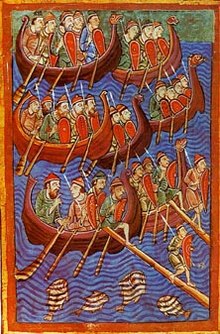Battle of Norditi
The Battle of Norditi (also the Battle of Nordendi or Battle of Hilgenrieder Bay ) was a battle between a Frisian army under Archbishop Rimbert of Bremen-Hamburg and an army of Danish Vikings in 884, which resulted in the complete withdrawal of the Vikings from East Frisia .
swell
The battle was first mentioned in the same year in the Annales Fuldenses on December 25, 884, where a brief note mentions a battle between Frisians and Normans in the Gau Norditi ( in loco, qui vocatur Norditi ), in which the latter was fought be. The localization of this Gaus as the later Norderland appears to be quite certain, even if the city of Norden might not have existed at that time. The annals also say that Archbishop Rimbert wrote a letter about the events to Archbishop Liutbert of Mainz, but this has not been passed down. It is possible, however, that this letter was before the church historian Adam of Bremen when he described the battle in more detail in the first book of his Gesta Hammaburgensis ecclesiae pontificum around 1070 and designated the site of the battle with a slight deviation as Nordwidi . The two mediaeval sources were later further embellished in Ubbo Emmius Rerum Frisicarum Historiae from 1596, without the latter having any further sources.
The battle
In the second half of the 9th century, Danish Vikings set up bases on the East Frisian coast from which they harassed the local population. Archbishop Rimbert of Bremen-Hamburg, who had to unsuccessfully break off the missionary mission of the Vikings in Scandinavia that his predecessor Ansgar had begun, was deeply concerned about this threat to the Church and the Empire. He therefore called on the Frisian population to resist the invaders, which he led personally in the autumn of 884.
In the course of the following battle, the Frisian army succeeded in pushing the Vikings back into the Hilgenrieder Bay near the north ( Hagermarsch municipality ), where many were surprised by the onset of the flood and drowned while fleeing. According to Adam von Bremen, for whom the glorification of Rimbert was an important concern in his church history, he made a significant contribution to their happy outcome through his words and prayers, while the local tradition emphasizes the courage and freedom of the Frisians. According to Adam of Bremen, 10,377 Vikings are said to have been killed in the battle and great treasures were looted by the Frisians, but this information must be regarded as far exaggerated. The folk tradition of Northern North goes on to say that Rimbert is said to have prayed on a boulder at the Ludgeri Church during the battle , so the water that collects in its hollows still has healing properties against warts.
The liberated lands and looted treasures are said to have been administered as community property afterwards. The “Battle of Norditi” thus forms the founding myth of the “ Theelacht ” to the north and is listed as one of the possible reasons for the granting of Frisian freedom to the Frisian population by the German-Roman emperors.
literature
- B. Bunte: The oldest name for north , In: Emder Jahrbuch 10 , 1892, pp. 119–121.
- Fritz Freese: Lewer doot as Slav. The saga of the Norman Battle in 884 in the Hilgenried Bay near the north. North 1976.
Web links
Individual evidence
- ^ Regesta Imperii: Annales Fuldenses V. (884 dec. 25 Papia). Retrieved May 4, 2012 .
- ↑ Gjallar: Gesta Hammaburgensis Ecclesiae Pontificum - liber I, c. 41 (884). Retrieved May 4, 2012 .
- ↑ Bunte, B .: The oldest name for north, In: Emder Jahrbuch 10, 1892, pp. 119–121.
- ↑ Gjallar: Annales Fuldenses (884). Retrieved May 4, 2012 .
